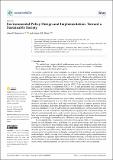Files in this item
Environmental policy design and implementation : toward a sustainable society
Item metadata
| dc.contributor.author | Hejnowicz, Adam Peter | |
| dc.contributor.author | Thorn, Jessica | |
| dc.date.accessioned | 2022-05-17T14:30:27Z | |
| dc.date.available | 2022-05-17T14:30:27Z | |
| dc.date.issued | 2022-03-09 | |
| dc.identifier | 279631713 | |
| dc.identifier | c773ff4a-678a-4880-a8cd-67dd8ae83415 | |
| dc.identifier | 000774308000001 | |
| dc.identifier | 85126285014 | |
| dc.identifier.citation | Hejnowicz , A P & Thorn , J 2022 , ' Environmental policy design and implementation : toward a sustainable society ' , Sustainability , vol. 14 , no. 6 , 3199 . https://doi.org/10.3390/su14063199 | en |
| dc.identifier.issn | 2071-1050 | |
| dc.identifier.other | ORCID: /0000-0003-2108-2554/work/117568929 | |
| dc.identifier.uri | https://hdl.handle.net/10023/25393 | |
| dc.description | We acknowledge funding by The Centre for the Evaluation of Complexity Across the Nexus, a UK Economic and Social Research Council large centre (project number: ES/N012550/1) and the UK Research Innovation’s Global Challenges Research Fund (UKRI GCRF) Living Deltas Hub. Plus, the UK Research and Innovation’s Global Challenges Research Fund (UKRI GCRF) through the Development Corridors Partnership project (project number: ES/P011500/1). | en |
| dc.description.abstract | The science could not be more emphatic, as a spate of hard-hitting assessments have indicated, achieving prosperous societies, climate stability and a flourishing biosphere requires urgent global action across scales and sectors. Meeting the ambitions of the post-2015 Sustainable Development agenda, Paris Climate Agreement, and the Convention of Biodiversity’s post-2020 Biodiversity Framework will require radical change in the design and implementation of environmental policies (SDG 17.14), especially those that intersect key goals of economic development (SDG 8, 9, 11) and production and consumption (SDG 2, 7, 12). Such policies must enable transitions towards knowledge-based economies grounded in evidence-based policy making. Here, the cooperation of city governments, the private sector, development practitioners, conservationists, communities, urban planners, and others will be key. The question then becomes how, under these conditions, can policies be effectively designed and implemented in a way that will steer societies towards more sustainable, inclusive outcomes in the short- and long-term future? This is a complex question and an enormous challenge, and in this Special Issue we only begin to scratch the surface. We do so in two substantive ways by advancing our understanding of: (a) the present state and effectiveness of local, national, and regional policies engaging with, and transforming, the climatic, environmental, social, and economic impacts of development activities; and (b) how environmental policies might be designed and embedded into future development planning to encourage coordination and coherence across policy domains. To accomplish this, we present a collection of ten papers focusing predominantly on sub-Saharan Africa, including two papers from Europe and Asia for wider relevance. Collectively, these studies work across spatial and temporal scales from local communities, to municipal, national, regional, and international levels and from recent decades up to the mid-21st century. These studies are situated in a range of systems, from urban to rural, dryland to tropical climates, and employ both qualitative and quantitative methodologies. While covering diverse themes, all studies relate to policy implementation, participation and equitable representation in decision making. Crucially, in an era where decolonisation is an increasingly important matter to address in academia and beyond, many article authors primarily live and work in the contexts they are researching. | |
| dc.format.extent | 10 | |
| dc.format.extent | 244374 | |
| dc.language.iso | eng | |
| dc.relation.ispartof | Sustainability | en |
| dc.subject | G Geography (General) | en |
| dc.subject | 3rd-DAS | en |
| dc.subject | SDG 8 - Decent Work and Economic Growth | en |
| dc.subject | SDG 13 - Climate Action | en |
| dc.subject.lcc | G1 | en |
| dc.title | Environmental policy design and implementation : toward a sustainable society | en |
| dc.type | Journal item | en |
| dc.contributor.institution | University of St Andrews. School of Geography & Sustainable Development | en |
| dc.identifier.doi | https://doi.org/10.3390/su14063199 | |
| dc.description.status | Peer reviewed | en |
This item appears in the following Collection(s)
Items in the St Andrews Research Repository are protected by copyright, with all rights reserved, unless otherwise indicated.

